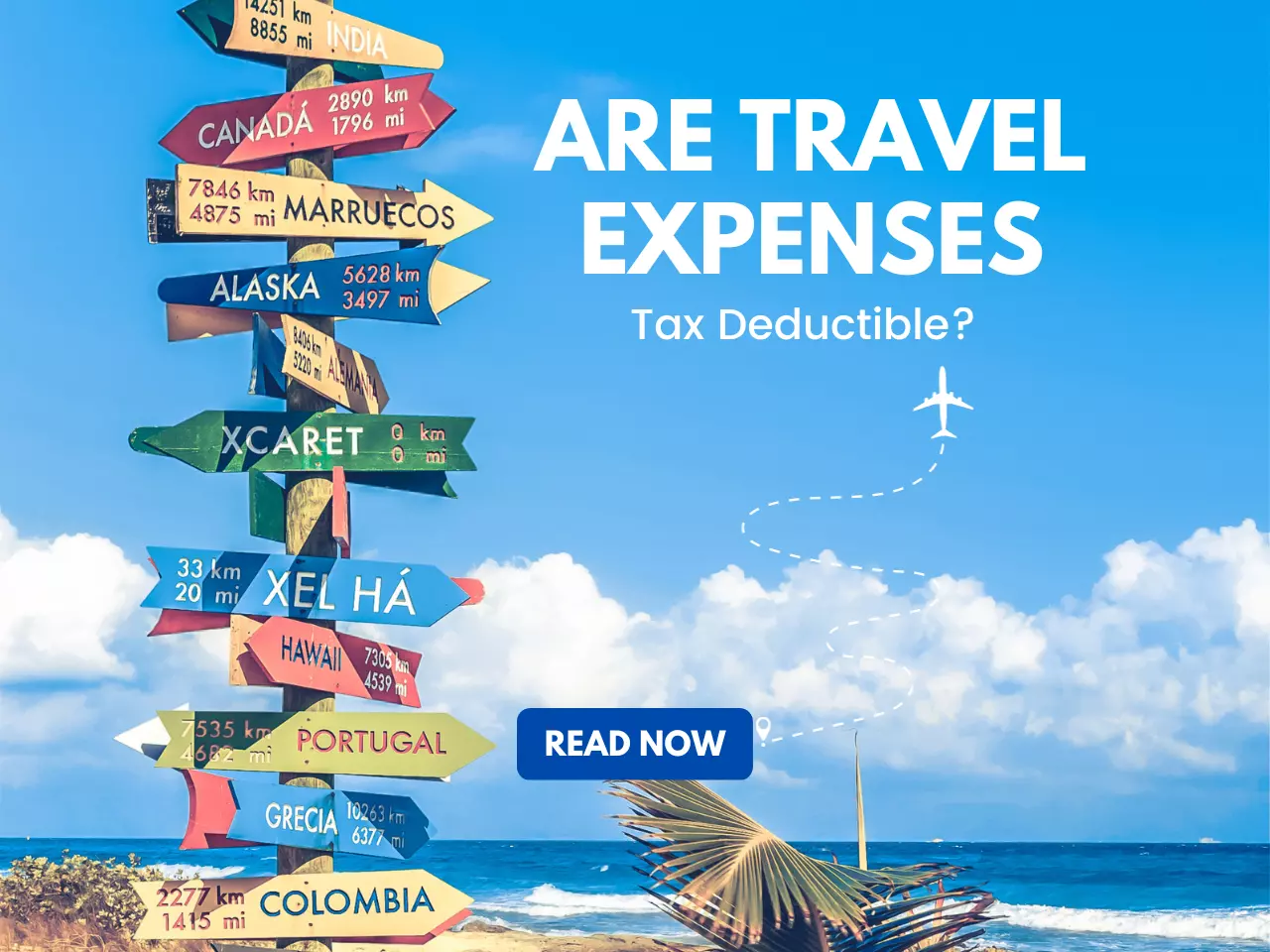In the maze of tax codes and deductions, a frequently asked question is, "Are Travel Expenses Tax Deductible?" As we navigate the ever-evolving landscape of tax regulations, it's essential to be informed about which expenses can lighten our financial burdens. This guide will unpack the criteria, documentation, and intricacies of claiming travel expenses, ensuring you're well-equipped to make the most of your eligible deductions in the upcoming tax season.
Understanding Business vs. Personal Travel
Navigating the landscape of travel deductions requires a clear understanding of the boundary that separates business and personal travel. Here's a closer look at these distinctions:
- Definition of business travel in the context of tax: Business travel, for tax purposes, refers to trips taken primarily for business-related activities that are necessary for the operation of one's profession or occupation. Such travels might include attending conferences, client meetings, training sessions, or any other engagements that have a direct bearing on one's work. The IRS (or relevant tax authority in your jurisdiction) typically stipulates that for a trip to qualify as business travel, its primary purpose must be directly related to your trade or business. It's crucial to maintain proper documentation, like itineraries, receipts, and even correspondence, that can substantiate the business nature of the trip.
- The distinction between entirely personal vacations and business-related trips: Personal vacations are trips taken solely for leisure, relaxation, or personal purposes, without any business intent or activities intertwined. They are not tax-deductible. However, the lines can blur when a trip mixes both business and personal activities. In such cases, taxpayers need to prudently allocate expenses that are genuinely related to business from those that are personal. For instance, if you extend a business trip for a couple of days to explore a city or take a detour for sightseeing, those additional days and related expenses would typically not qualify for tax deductions.
Being able to differentiate between business and personal travel is paramount when preparing tax returns. Misclassifying trips or failing to allocate expenses correctly can lead to complications, including potential audits or penalties.
Criteria for Deducting Travel Expenses
The tax implications of travel expenses often hinge on specific criteria that determine their deductibility. To ensure that you're correctly claiming deductions without running afoul of regulations, it's essential to understand the following benchmarks:
- The trip must be primarily for business: For travel expenses to be deductible, the primary reason for the trip must be business-related. This doesn't mean that the trip can't involve any personal activities, but the main purpose must revolve around business. For instance, if you attend a business conference for four days and then spend an additional two days sightseeing or visiting friends, only the expenses incurred during the four business-related days can potentially be deductible.
- The necessity of the trip for the business: The travel should be considered necessary for your business operations. This could be for various reasons like meeting clients, attending training, purchasing supplies, or any other business essential task. Simply wanting to take a trip or choosing a more expensive mode of travel without a valid business justification might not qualify the expenses for deduction.
- Typical duration and tests to determine the primary purpose of travel: The duration of the trip can offer insights into its primary purpose. A common rule of thumb is looking at the number of days spent on business activities versus personal activities. Generally, if more than half of the days on a trip are dedicated to business activities, the trip can be considered primarily for business. However, every tax jurisdiction might have its specific tests or qualifiers. For example, some might look at the actual activities undertaken each day or the importance of the business tasks compared to personal activities.
While these criteria provide a general framework, always consult with a tax professional or familiarize yourself with your local tax guidelines. Proper documentation and a clear understanding of these principles will help ensure you're on solid ground when claiming travel-related deductions.
Common Deductible Travel Expenses
Understanding which travel expenses can be deducted from your taxes is crucial for effective financial management, especially for those who frequently find themselves on the move for business. Let's delve into the commonly deductible costs associated with transportation:
Transportation Costs:
- Airfare, train tickets, car rentals, public transportation: The foundational costs of any business trip are usually centered around how you get from point A to point B. Whether you're taking a flight to a business conference, hopping on a train for a client meeting, renting a car to navigate an unfamiliar city, or utilizing public transportation like buses and subways, these costs can typically be deducted. Remember, always keep detailed records, including receipts and the reasons for your trips, to substantiate these deductions.
- Using a personal car for business - mileage deductions: If you're using your personal vehicle for business-related activities, you can generally claim a deduction based on a standard mileage rate or the actual expenses incurred, such as gas, maintenance, and depreciation. The standard mileage rate can fluctuate yearly, so it's essential to stay updated with the current rate provided by the IRS (or your local tax authority). When claiming this deduction, maintaining a detailed log of your business trips, including dates, purposes, and distances traveled, is paramount to validate your claims.
While these transportation expenses are among the most common deductions, always consult with a tax expert or refer to the latest tax codes to ensure you're making accurate and valid claims. Proper documentation and adherence to guidelines will ensure your deductions stand up to scrutiny.
Accommodations:
Hotels, motels, and other lodging: Accommodation expenses are a significant component of business travel costs. If you're traveling for business purposes and need to stay overnight, the costs associated with hotels, motels, or other forms of lodging are generally deductible. This includes not only the room rate but also any taxes and fees that come with it. If your business trip is extended and you opt for a temporary housing solution or a serviced apartment, those costs can also typically be included as deductible expenses.
Limits and considerations:
- Reasonableness: The tax authorities often emphasize the "reasonableness" of expenses. This means that if you opt for a luxury suite when a standard room would suffice, the excessive part of the cost might not be deductible. Always consider the necessity and appropriateness of the accommodation in relation to the business purpose of the trip.
- Mixed Use: If you extend your stay for personal reasons or share the accommodation with someone who is not involved in the business aspect of the trip, you may need to allocate the cost between deductible business expenses and non-deductible personal expenses.
- Location: Lodging expenses should be proximate to the business site. If you choose to stay at a distant location for personal preferences, the extra commuting costs may not be deductible.
- Documentation: Always keep detailed receipts from your accommodation providers. These should show the breakdown of costs, dates of stay, and any other charges. This documentation is vital for substantiating your claims should they be questioned.
Remember, while accommodations are a common area for travel deductions, it's essential to approach these deductions with an understanding of the nuances involved. When in doubt, consulting with a tax professional can provide clarity and guidance.
Meals and Entertainment:
The 50% rule and exceptions: Generally, for tax purposes, only 50% of meal and entertainment expenses associated with business travel are deductible. This is often referred to as the "50% rule." It's designed to account for the inherently personal nature of eating, even if it's done in a business context. However, there are exceptions:
- Full Deductions: Some situations allow for a full 100% deduction. This might include instances where meals are a nondiscriminatory benefit provided to all employees (like a company-wide event) or where the meal expense is incurred during a charitable event.
- Non-Deductible Situations: If the meal or entertainment expense is deemed lavish or extravagant, it might not be deductible at all. The definition of "lavish" can be subjective and might depend on the context, but it's always good to be prudent and reasonable with spending.
Documentation and receipts: Maintaining thorough documentation is vital when claiming deductions for meals and entertainment:
- Itemized Receipts: Always retain itemized receipts from restaurants or entertainment venues. This not only provides proof of the expense but also offers a breakdown of what was purchased, which can be crucial in determining the business nature of the expenditure.
- Business Purpose: On the back of the receipt or in a travel diary, note down the specific business purpose of the meal or entertainment. Include details like the names and business relationships of those in attendance, the nature of the business discussion, and any decisions made or actions resulting from the gathering.
- Date and Location: Ensure the date and location are clearly mentioned. This helps correlate the expense with other aspects of the business trip.
Given the nuances in deducting meals and entertainment expenses, it's crucial to be meticulous in record-keeping and stay updated with tax regulations. When complexities arise, seeking advice from a tax professional can provide valuable insights.
Miscellaneous Expenses:
While transportation, accommodation, and meals often make up the bulk of travel-related deductions, a myriad of other miscellaneous expenses can also qualify. These often-overlooked costs can accumulate and offer significant opportunities for deductions.
- Conference fees, seminar costs: Educational and professional development events like conferences and seminars are essential for many professionals. The costs associated with attending these, such as registration fees or materials, are typically deductible. This extends to workshops or breakout sessions that might have separate costs. It's important to ensure that the conference or seminar has a direct relation to your trade or business.
- Internet charges, phone calls, faxes related to business: In today's connected world, staying in touch while traveling is vital. Charges you incur for business-related internet access, international or local phone calls, and even the occasional fax can be deductible. This includes charges for Wi-Fi in hotels, data roaming fees, or one-off internet access fees at conference centers.
- Tips and gratuities: The service industry often relies on tips and gratuities as part of its income structure. When you tip service providers during a business trip — be it bellhops, waitstaff, taxi drivers, or hotel housekeeping — those amounts can generally be included as deductible travel expenses. It's always a good practice to keep a small notebook or digital log to jot down these often-cash-based expenses, as they can quickly add up.
For all miscellaneous expenses, the golden rule remains the same: maintain detailed and clear documentation. For some of the smaller expenses, like minor tips, detailed receipts might not be available. In such cases, making a habit of recording the expense contemporaneously, along with its business purpose, can be invaluable during tax time. Always ensure that the miscellaneous expenses have a direct connection to your business activities to ensure they stand up to scrutiny.
Partial Deductions and Mixed-Purpose Trips
When business and leisure activities overlap on a trip, it's essential to allocate expenses accurately between the two to ensure proper tax deductions. Let's explore how to do this and delve into some illustrative scenarios.
Allocating Expenses Between Business and Personal Activities:
- Determine the Primary Purpose: The trip's main objective dictates whether you can deduct transportation expenses to and from the destination. A trip primarily for business will allow these deductions, whereas a predominantly personal trip won't, even if some business is conducted.
- Day-by-Day Analysis: Break down the trip day by day. For each business-focused day, you can typically deduct associated expenses, such as lodging and meals (keeping in mind the 50% rule for meals). Days dedicated to personal activities won't have deductible expenses.
- Incidental Expenses: Some costs are harder to split, like hotel internet fees or resort charges. In these cases, prorate based on business days versus total days. For example, if you have a 10-day trip with 6 business days, 60% of these incidental costs could potentially be deducted.
Examples and Scenarios:
- Conference Plus Sightseeing: Imagine you're attending a five-day conference in Paris. After the conference, you decide to stay three additional days for sightseeing. Your round-trip flight to Paris is fully deductible since the trip's primary purpose is business. Hotel, meals, and other related expenses during the five conference days are deductible (with the 50% rule applied to meals). However, the costs for the additional three days of sightseeing are personal expenses and aren't deductible.
- Business in Multiple Locations: You fly to New York for a two-day business meeting and then head to Boston for a day of personal activities before returning home. The flight to New York and the associated expenses for those two days are deductible. However, the travel costs to Boston and related expenses for that day are personal and not deductible.
- Family Accompaniment: Suppose you're traveling to a business seminar in San Diego and decide to bring your family along for a mini-vacation. While your individual hotel room cost, seminar fee, and personal meal expenses related to the business days are deductible, any additional costs for family members (extra hotel rooms, their meals, entertainment, etc.) are personal expenses and cannot be deducted.
- Weekend Stay for Reduced Airfare: Sometimes, airfares are cheaper if you include a Saturday night stay. If you extend your business trip by a day or two to avail of a reduced fare, even if those extra days are personal, you can still deduct the cost of the flight. However, lodging and meals for those additional days are personal expenses.
In all scenarios, meticulous documentation is paramount. Keeping a clear diary detailing each day's activities and associated expenses ensures clarity between business and personal costs. Always ensure you adhere to local tax guidelines and, when in doubt, seek advice from a tax professional.
International Travel Considerations
Navigating the tax implications of international business travel can be intricate due to the added complexities of crossing international borders. While many of the domestic guidelines still apply, there are specific rules and considerations to keep in mind for overseas business trips.
Specific Rules for Overseas Business Trips:
- Allocation of Expenses: For international trips, it's essential to allocate travel expenses between business and personal activities. If the trip is entirely for business, transportation expenses (like round-trip airfare) are typically fully deductible. However, if the trip combines business and personal activities, allocating these costs becomes necessary, and full deductions may not apply.
- Reasonable Timeframe: The IRS and tax authorities in other countries often consider the amount of time spent on a trip to determine its primary purpose. If your travel includes a substantial amount of time not allocated to business activities, it may impact the deductibility of your transportation expenses.
- Destination Matters: If your job mandates that you work in a specific location overseas, this bolsters the argument for the business necessity of the trip. Conversely, if the same tasks could be accomplished domestically, it might be challenging to justify the trip as primarily business-related.
Duration Tests and Primary Purpose Assessment:
- One Week or Less: If your trip lasts a week or less, excluding the day of departure but including the day of return, it's generally considered entirely for business (assuming all days are business days). Thus, transportation costs to and from the destination are fully deductible.
- More Than One Week: If the trip exceeds a week, the percentage of business days compared to total days becomes pivotal. If a significant portion is spent on non-business activities, it may limit the deductibility of transportation costs.
- Primary Purpose Determination: The primary reason for your trip becomes especially crucial for international travel. If more of your trip's days are dedicated to business than personal activities, the primary purpose is considered business, making transportation costs deductible. Activities on weekends, holidays, or other necessary standby days can be considered business days if they fall between business activities.
- Day-to-Day Analysis: For international trips, it's even more critical to maintain a detailed daily log, showcasing the specific purpose of each day. This can help substantiate claims and clarify the business nature of the trip.
While international business travel offers exciting opportunities and potential tax deductions, it also comes with its set of challenges. Keeping meticulous records, understanding the nuances of international tax regulations, and consulting with tax professionals well-versed in international travel can ensure compliance and optimize deductions.
Documentation and Record-Keeping
In the realm of tax deductions, especially for travel expenses, the adage "If you didn't document it, it didn't happen" rings true. Proper documentation and meticulous record-keeping are vital not only for optimizing your deductions but also for safeguarding against potential audits or queries from tax authorities.
1. Importance of Keeping Detailed Records:
- Audit Protection: Detailed records serve as your primary defense in the event of an audit. They validate your claims and provide transparency regarding your expenses.
- Optimizing Deductions: Without clear records, you might forget or overlook potential deductible expenses. Over time, these overlooked amounts can accumulate, leading to significant lost opportunities for deductions.
- Peace of Mind: Knowing that you have comprehensive records offers peace of mind and confidence when filing your taxes, ensuring you're both maximizing deductions and adhering to regulations.
2. What to Document:
- Dates: Clearly document the beginning and end dates of your trip. For extended stays, a day-to-day log is beneficial, especially for mixed-purpose trips.
- Locations: Record where you traveled and, if applicable, the various destinations within a trip. For example, if you had business in both New York and Boston on the same trip, document each location separately.
- Business Purpose: For each expense, briefly note the business reason behind it. Whether it's a meal with a client, a seminar fee, or hotel costs for a business conference, a clear business justification is crucial.
Expense Details: For every expense:
- Capture the amount.
- Save the itemized receipt.
- Note down the vendor or service provider (e.g., the restaurant or hotel name).
- Document the nature of the expense (e.g., lunch, lodging, car rental).
3. Potential Tools and Apps for Tracking Expenses:
- Expensify: This app automates the expense reporting process. You can capture receipts with your phone's camera, and the app will automatically extract and categorize the details.
- QuickBooks: While primarily an accounting tool, QuickBooks offers robust expense tracking features, especially useful for business owners.
- Concur: Used by many larger corporations, Concur provides comprehensive expense management services, integrating travel bookings with expense reporting.
- Evernote: While not an expense-specific app, Evernote's versatility allows users to snap photos of receipts, tag them, and add notes, creating an organized digital trail of expenses.
- MileIQ: For those who use personal vehicles for business purposes, MileIQ automatically tracks miles, making it easier to calculate potential deductions.
Regularly updating and maintaining your records, preferably contemporaneously with the expense, ensures accuracy and completeness. As tax regulations evolve and technology advances, stay updated on best practices and utilize tools that streamline and simplify the record-keeping process.
Common Misconceptions and Pitfalls
The realm of tax deductions, particularly in the context of travel and business expenses, is rife with potential misconceptions. Avoiding these common pitfalls is essential to ensure compliance with tax regulations and to maximize potential deductions. Here are some of the prevalent misconceptions and pitfalls:
1. Expenses That Are Not Deductible:
- Commuting Costs: Daily commuting to and from your regular workplace isn't deductible, even if you conduct business (like making business calls) during the commute.
- Extravagant or Lavish Expenses: While business-related meals or accommodations are deductible, those deemed extravagant or lavish may not be fully deductible. The IRS typically allows deductions that are "ordinary and necessary."
- Family or Friends: If you take a family member or friend on a trip, their expenses aren't deductible unless they're an employee and have a genuine business purpose for the trip.
- Entertainment Costs: As of recent tax laws, most entertainment expenses, even if they're business-related, are no longer deductible.
2. Overlooking Potential Deductions:
- Partial Deductions: Some business owners neglect partial deductions for mixed-purpose trips, mistakenly believing they can't claim anything if the trip isn't entirely for business.
- Home Office: For those who qualify for a home office deduction, a portion of home expenses can be deductible, but many overlook this.
- Education and Training: Work-related education and training can be deductible, but they're often missed.
3. Errors That Could Trigger Audits:
- Round Numbers: Using too many rounded numbers can be a red flag. It's unlikely every expense was a neat $100 or $500. It suggests estimates rather than precise figures.
- Claiming Too Many Deductions: Consistently reporting losses or reducing your taxable income to near zero by claiming a high number of deductions can attract unwanted attention.
- Not Keeping Receipts: For expenses above $75, the IRS typically requires receipts. Not having these available is a common pitfall.
- Mismatched Reports: If your reported expenses don't match what vendors or payment processors report to the IRS, it raises concerns. For instance, if a credit card company reports a certain amount paid to you, but you report a different figure, it could trigger an audit.
- Combining Personal and Business Expenses: Using a business account for personal expenses or vice versa can muddy the waters. It's best to keep these separate to ensure clarity.
Understanding what's deductible and what's not is crucial to avoid common misconceptions. Keeping meticulous records, regularly consulting updated tax laws, and, if possible, seeking guidance from tax professionals can mitigate these pitfalls and ensure you're on the right path.
Consulting with a Tax Professional
Navigating the intricacies of tax deductions, especially in areas like travel expenses, can be daunting for many individuals and businesses. Engaging a tax professional offers not only peace of mind but also the potential for financial benefits. Here's why consulting with an expert can be advantageous and how to find the right fit:
1. Benefits of Seeking Expert Advice:
- Maximizing Deductions: A tax professional can pinpoint deductions you may have overlooked, ensuring you benefit from all allowable deductions.
- Error Prevention: Mistakes in tax filings can lead to audits, penalties, or missed deductions. A tax professional can help avoid these pitfalls.
- Time-Saving: Understanding tax codes and regulations is time-consuming. A tax professional's expertise can save significant time and stress.
- Keeping Updated: Tax laws and regulations evolve. Professionals stay updated on these changes, ensuring compliance and optimized deductions.
- Audit Assistance: In the rare event of an audit, having a tax professional by your side can be invaluable. They can offer guidance, support, and even representation.
- Long-term Planning: Beyond immediate tax filings, tax professionals can offer insights into long-term tax planning, helping to structure financial strategies for future benefits.
2. Finding a CPA or Tax Advisor Familiar with Travel Deductions:
- Referrals and Recommendations: Ask friends, family, or business associates for recommendations. Especially seek out those who frequently travel for business and have similar financial structures or needs.
- Professional Associations: Organizations such as the American Institute of Certified Public Accountants (AICPA) have directories of CPAs by specialization.
- Reviews and Testimonials: Online platforms like Google, Yelp, or specific industry forums might have reviews of tax professionals in your area.
- Interview Potential Advisors: Once you've shortlisted a few professionals, arrange consultations. Discuss your specific needs related to travel deductions. Ask about their experience, previous client scenarios, and their approach to maximizing deductions.
- Check Credentials: Ensure the professional is licensed and in good standing. For CPAs, you can usually verify this through your state's Board of Accountancy.
- Fees and Structure: Understand their fee structure. Some might charge hourly, while others might have a fixed fee. Ensure their charges align with the value they bring and your budget.
- Ongoing Education: Tax laws change. Check if the professional engages in ongoing education to stay updated on the latest tax laws and regulations.
While it's possible to navigate tax deductions on your own, the complexities of areas like travel deductions can be alleviated with the expertise of a tax professional. Investing in expert guidance can save money, time, and potential legal complications in the long run.
Conclusion
Tax deductions, especially those related to travel, can be a labyrinth of complexities, yet they present valuable opportunities for savings. Let's recap the pivotal insights from our discussion:
- Nature of Travel: Understanding the distinction between business and personal travel is foundational. Remember, the primary purpose of the trip often dictates its tax implications.
- Eligible Expenses: From transportation and accommodation to meals and miscellaneous costs, recognizing what is and isn't deductible is vital. However, just because an expense occurs during a business trip doesn't automatically make it deductible.
- Documentation: Proper record-keeping isn't just recommended; it's essential. Maintain detailed logs of dates, locations, purposes, and expense details. Tools and apps can assist in this endeavor, making the process more manageable and accurate.
- Misconceptions: Avoiding common pitfalls, like non-deductible expenses or errors that could invite audits, can save both money and hassle.
- Professional Guidance: Consulting with a tax professional, particularly one familiar with travel deductions, can prove invaluable. Their expertise can optimize deductions, ensure compliance, and provide peace of mind.
Travel-related deductions can significantly impact your tax savings. However, maximizing these benefits requires diligence, understanding, and sometimes professional advice. As tax laws and regulations evolve, it's crucial to stay informed. An organized approach, not just during tax season but throughout the year, will position you for optimal financial benefits. Remember, every penny saved in taxes is a penny earned, so invest the time and effort to grasp travel-related deductions fully. Safe travels and savvy savings!
Resources & Further Reading
When it comes to understanding travel deductions, diving deeper into trusted resources can enhance your comprehension and ensure you're making well-informed decisions. Below is a list of official tax documents, publications, and recommended readings on the subject:
Official Tax Documents and Publications:
- IRS Publication 463 (Travel, Gift, and Car Expenses): This is the primary resource provided by the IRS that covers the specifics of what travel expenses are deductible and how to report them.
- IRS Publication 535 (Business Expenses): While it covers a broader range of business expenses, it contains relevant sections on travel deductions.
- IRS Topic No. 511 (Business Travel Expenses): A more condensed guide that provides an overview of deductible business travel expenses.
- Form 2106 (Employee Business Expenses): For employees who have unreimbursed travel expenses, this form is crucial.
Recommended Books or Guides:
- "Deduct It! Lower Your Small Business Taxes" by Stephen Fishman: This comprehensive guide covers a wide range of business deductions, including travel. It's updated annually to reflect the latest tax laws.
- "Tax Savvy for Small Business" by Frederick W. Daily: Focusing on the broader spectrum of tax strategies for small businesses, this book offers insights into travel deductions and how they fit into a larger tax-saving strategy.
- "Every Landlord's Tax Deduction Guide" by Stephen Fishman: For landlords, travel can sometimes be a business expense. This book delves into those specifics.
- "The Ultimate Guide to Tax Deductions for the Self-Employed" by Wayne Davies: Tailored for the self-employed, this guide gives a comprehensive look at deductions, including those related to travel.
- "J.K. Lasser's Small Business Taxes" by Barbara Weltman: An annually updated guide that's been a staple for small business owners for years. It has sections dedicated to travel and entertainment expenses.
Websites & Blogs:
- The Tax Adviser: Run by the AICPA, this site frequently offers articles on specific tax topics, including travel deductions.
- TurboTax Blog: Intuit's TurboTax has a blog that often discusses tax deductions, and they occasionally focus on travel expenses.
- Accounting Today: This site often has articles related to tax strategies and deductions for businesses.
As with all tax matters, laws and regulations can change. It's essential to ensure that any resource or guide you reference is up-to-date with the latest information. Additionally, while these resources provide valuable information, consulting a tax professional or CPA tailored to your specific needs is often the best approach. Safe travels and savvy savings!









